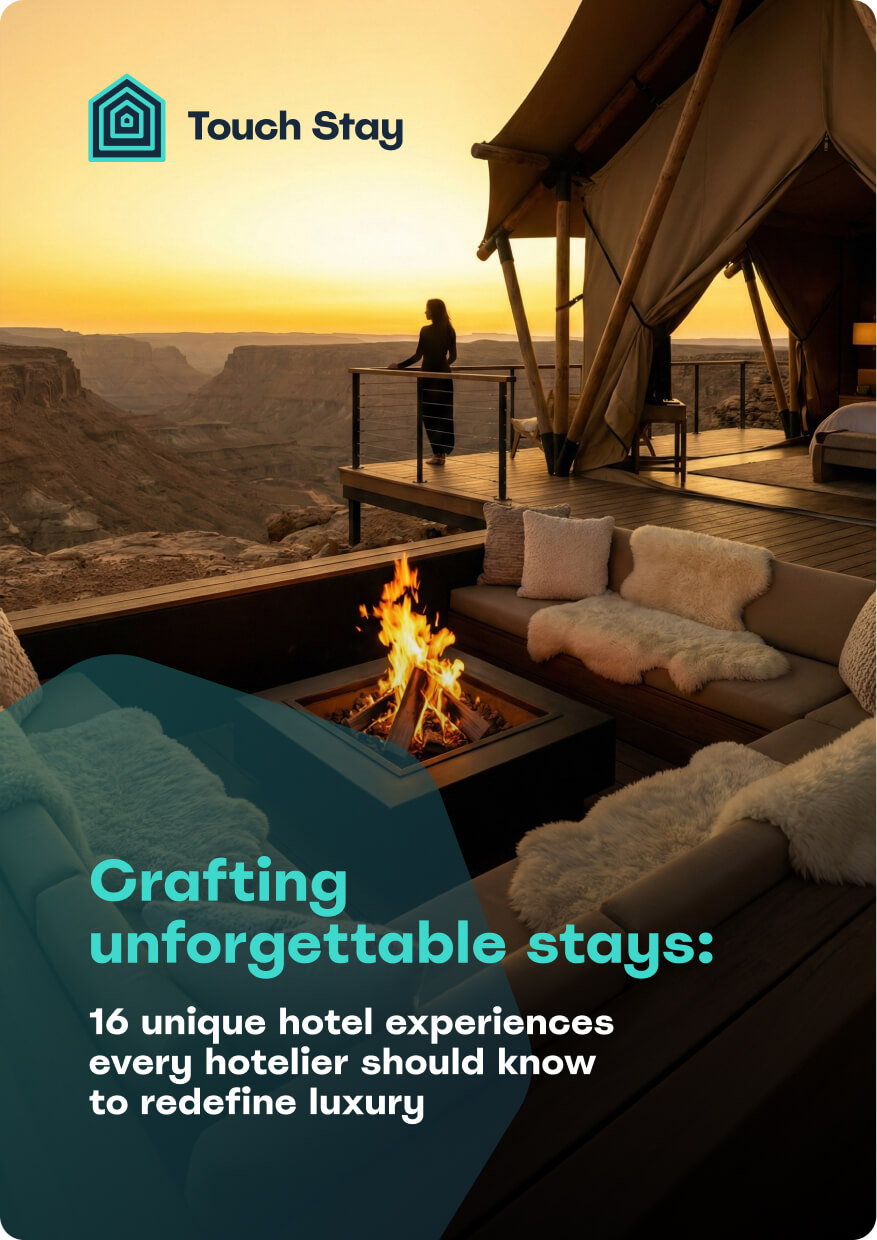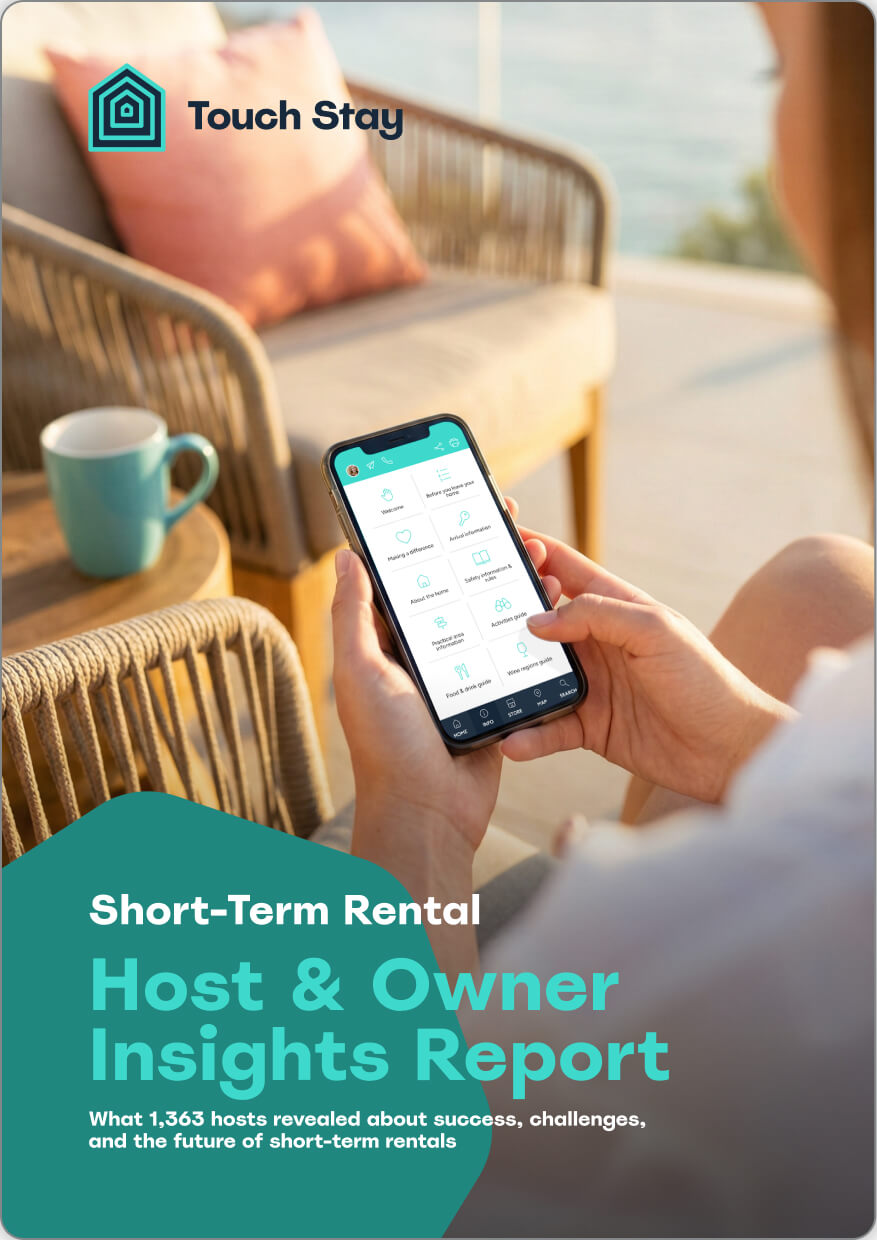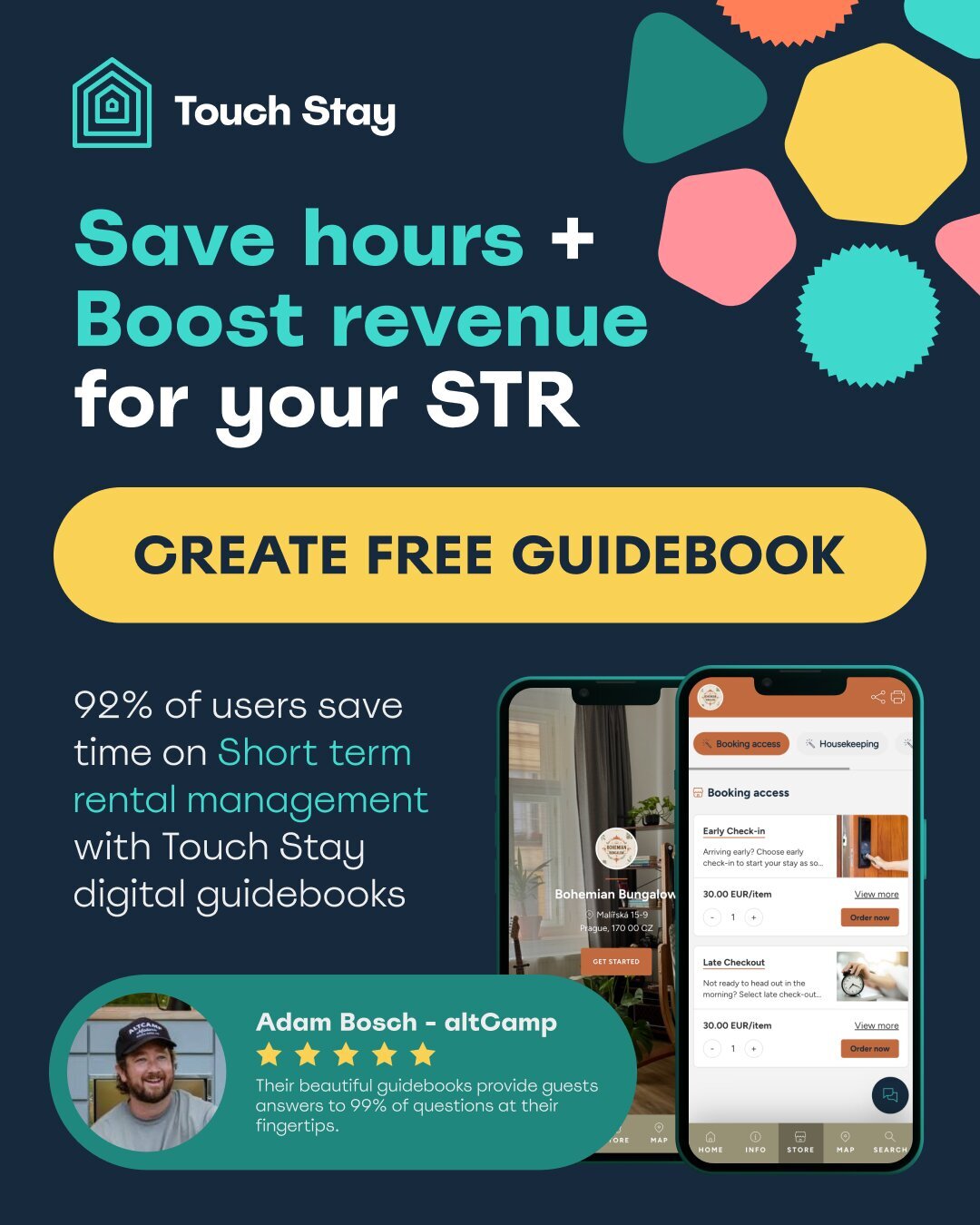The short term rental industry has developed its own unique lingo over the years. With so many terms and acronyms commonly used, it can get confusing for newcomers. That's why we've put together this A-Z guide to short term rental terminology to help you navigate like a pro.
From Airbnb to zoning regulations, this alphabetical guide covers the main technical terms and industry jargon you’re likely to encounter in the world of short term vacation rentals. Studying up on these will help you hit the ground running!
Pro tip💡Looking to save hours on guest communications, and boost revenue with upsells?
Generate your digital guest guide in seconds
Simply paste your Airbnb or Booking listing link. No card required.
A is for…
- ADR (Average daily rate): measures the average rental revenue earned for an occupied room per day.
- Advance payment: a portion of the rental cost paid upfront by the guest.
- Airbnb: the biggest and best-known short term rental platform for people to list, discover, and rent unique accommodations around the world.
- Agency/Self-catering agency (a.k.a. PM): the company responsible for the bookings, cleaning, and maintenance of one or multiple properties.
- Amenity fee: an additional charge for using specific features like a hot tub or pool.
- API (Application Programming Interface): allows different software applications to communicate with each other.
- Availability: dates your rental is open for booking.
- Avantio: an all-in-one PMS solution for scaling your short term rental business.
B
- Booking.com: a major online travel agency that focuses on accommodation bookings, including vacation rentals.
- Booking window: the time frame guests can book, often 3-12 months ahead.
C
- Cancellation policy: your guidelines for guest cancellations and refunds.
- Changeover (a.k.a. Turnover): the cleaning process between guest stays.
- Channel manager: software that connects your property to OTAs and synchronises availability and details across all platforms.
- Cleaning fee: a separate charge for post-stay cleaning varying on the size of the property and the extent of cleaning required.
D
- Damage deposit: a refundable sum paid by a guest at the start of a booking to cover any potential damage during their stay.
- Direct booking: guests booking directly through your website, bypassing platforms.
- Double booking: accidentally booking the same dates to multiple guests.
- Double occupancy: two people sharing a room. The rate for a room is often based on double occupancy, meaning it is intended to accommodate two guests
- Dynamic pricing: a strategic approach that uses tools to automatically adjust prices based on the season and level of demand.
E
- Escapia: a leading PMS for managing reservations, accounting, property listings, maintenance, housekeeping, and more.
- Extenuating circumstances policy: the conditions under which a guest can get a full or partial refund due to unforeseen situations, e.g. family emergency.
- Extra person fee: an additional charge for any extra guests above those covered by the base rental fee.
F
- Flexibility: offering flexible policies and check-in/out times can attract more guests and improve your occupancy rates.
G
- GBV (Gross booking value): the value of bookings in a specific period (inclusive of host earnings, service fees, cleaning fees, and taxes, net of cancellations and alterations that occurred during that period).
- Guest communication: timely and clear communication with guests.
- Guest reviews: feedback and ratings left by guests about their stay.
- Guesty: an automation tool that addresses time-consuming problems faced by short term rental property managers.
- Ghost hotel: an apartment block or estate run solely as short term rentals without any long-term residents.
H
- Homestay: renting out a room in your own home to guests.
- Host: the owner or manager of the short term rental property.
- Host guarantee: protection offered by platforms in case of property damage.
- House rules: guidelines guests must follow during their stay.
- Housekeeping: optional service for cleaning during a guest's stay.
I
- Income potential: the earning potential of your holiday let.
- Instant booking: allowing guests to book without pre-approval.
- Inventory: the specific properties you offer for short term stays. Using tools such as BlueTally for inventory management can help you keep track of all assets efficiently.
J
- JIT (Just-in-time) housekeeping: an inventory management system to increase efficiency, maintain a clean, organised environment, and reduce waste.
- Junk fee: unnecessary charges not clearly disclosed to guests.
K
- Key Data: an online tool used by hosts and property managers to glean insights into maximising short term rental performance.
- Key pick-up/drop-off: the process of exchanging keys in person or via lockboxes for self check-in/out.
- Keyless entry: secure access system using codes or smart locks.
L
- Lead time: the period between booking and arrival.
- Length of stay: the duration of a guest's booking.
- Listing description: compelling and informative details about your rental listed on an OTA.
- Local regulations: laws and rules governing short term rentals in your area.
- Lodgify: a popular PMS that offers a range of business automation tools to simplify bookings, property management, website building, and more.
M
- Maintenance: tasks such as cleaning, repairs, and updates to keep your short term rental in top condition.
- Mid-stay clean: optional charge for additional cleaning during a guest's stay.
- Minimum booking value: the lowest total amount accepted for a stay.
- Minimum stay: the shortest booking duration you allow.
- MLS (Multi-listing service): platform for listing properties with real estate agents.
N
- Neighbourhood: where your property is located. Highlighting nearby attractions, amenities, and local flavour can help attract more bookings and enhance the guest experience.
- Nightly rate: the price per night for your short term rental.
- No-show: a guest who books but doesn't arrive.
- Noise complaint: a complaint made by a neighbour about excessive guest noise.
- Noise policy: rules regarding noise levels and parties at the rental property.
O
- Occupancy rate: the percentage of days your rental is booked in a year or given period.
- Occupancy tax: a tax levied on guests for short term stays.
- Off-season: periods with lower demand and potentially lower rates.
- OTA (Online travel agency): platforms like Airbnb and Vrbo.
- Overbooking: a risky strategy used by hoteliers to maximise occupancy. While 100% occupancy is the ultimate goal, overbooking risks displacing guests and having to arrange alternative accommodation at the hotel's expense.
- OwnerRez: a leading PMS offering channel management, CRM automation, accounting, property reports, and website building tools.
P
- Peak season: periods with high demand and potentially higher rates.
- Pet policy: whether you allow pets at your rental and any associated fees.
- Platform fee: commission charged by booking platforms like Airbnb.
- PriceLabs: a dynamic pricing tool to increase revenue and occupancy.
- Pricing strategy: pricing optimised for demand, seasonality, and competition.
- PMS (Property management system): software for managing bookings, pricing, cleaning etc.
- PM (Property manager): the person or company responsible for the bookings, cleaning, and maintenance of one or multiple properties.
Q
- Quiet hours: designated times for reduced noise at your property.
- Quality score: Airbnb's rating system for property condition and host performance based on accuracy, check-in, cleanliness, communication, location, and value.
- Quality assurance: ensuring a high-quality guest experience through cleanliness, amenities, and service.
R
- Rental agreement: a legal contract outlining the terms of a guest's stay.
- Rentals United: a cloud-based channel manager, providing an all-in-one solution for vacation rental marketing, distribution and operation management.
- Revenue management: optimising your pricing and availability for bookings.
- Reviews: guest-written feedback and star ratings for the rental property and host.
- Review score: average rating your rental receives from guests.
- RevPAR: the revenue per available rental per day, month, or year.
S
- Seasonality: fluctuations in demand and pricing throughout the year.
- Security deposit: a refundable deposit held in case of property damage.
- Self check-in: guests access the property without host interaction.
- Shoulder season: the period of time between a rental's peak season and off-season.
- SPH (Spend per head): the amount of revenue being earned on a per customer basis.
- STR: short term rental.
- Superhost: a revered status gained on Airbnb. Superhosts maintain an overall rating of 4.8 and provide exceptional experiences with high response and low cancellation rates.
T
- Turno: an online tool for owners and property managers to find, schedule, and pay short term rental cleaners.
- Turnover (a.k.a. Changeover): the cleaning process between guest stays.
- Turnover time: the time it takes to prepare a property for the next guest after a checkout.
U
- USP (Unique selling proposition): what makes your rental stand out?
- Upgrades: add-ons, e.g. early check-in, that guests can pay extra for.
- Upselling: offering additional services or amenities for an extra fee.
V
- Vacation rental: a fully furnished property rented out on a short term basis.
- VRM (Vacation rental manager): company managing your rental on your behalf.
- Vrbo: popular online vacation rental platform.
W
- Welcome basket: amenities provided for arriving guests.
- Welcome book: an information guide on the property, local area, amenities, house rules etc. Learn more about digital guest welcome books
- Wi-Fi: offering wireless internet access to guests.
X
- Extraordinary experiences: unique activities or offerings you provide.
Y
- Yard maintenance: upkeep of outdoor spaces.
- Yield management: maximising revenue by adjusting pricing dynamically based on demand.
Z
- Zero-tolerance policy: a clear policy for violations of house rules on smoking, parties, or property damage.
- Zoning regulations: local laws concerning short term rental usage.
Whether you're a seasoned host or just starting out, mastering the language of short term rentals is essential for success. By staying informed and adapting to the ever-changing landscape, you'll be well on your way to becoming a confident and successful short term rental host, maximising your earning potential and creating memorable experiences for your guests.
Fluent in STR or not, take your hosting game to the next level with a Touch Stay digital guidebook

Ned
Ned has clocked up over 11 years in digital marketing and comms, with a strong focus on creating engaging content for a range of brands and agencies. When he’s not writing, he can be found digging for records, peering through his telescope at the night sky, or onboard his local lifeboat where he volunteers as a crewmember.
Be the first to know!
Join our newsletter for early access to:
- ✅ Free guides
- ✅ Pro tips & tricks
- ✅ Time saving tutorials
- ✅ Latest blog posts
- ✅ Checklists & templates






















.webp?width=50)